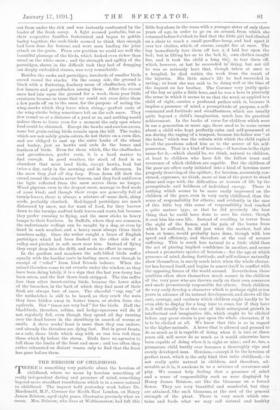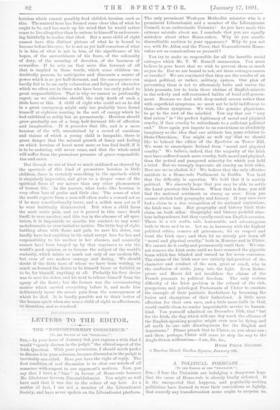THE HEROISM OF CHILDHOOD.
frIHERE is something very pathetic about the heroism of childhood, where we mean by heroism something of really independent daring and presence of mind, something 'beyond mere steadfast trustfulness which is in a sense natural to childhood. The inquest held yesterday week before Dr. Macdonald, M.P., Coroner for North-East London, on Henry James Bristow, aged eight years, illustrates precisely what we anean. Mrs. Bristow, who lives at Walthamstow, had left this
little boy alone in the room with a younger sister of only three years of age, in order to go on an errand, from which she returned before 6 o'clock to find that the little girl had climbed on a chair to reach a small paraffine-lamp, and had upset it over her clothes, which, of course, caught fire at once. The boy immediately tore them off her, A .d laid her upon the bed ; but in lifting her on to the bed, h, own clothes caught fire, and it took the child a long tit, to tear them off, which, however, at last he succeeded in doing, but not till he was so seriously hurt that, though taken at once to a hospital, he died within the week from the result of the injuries. His little sister's life he had succeeded in saving; at least she was said to be doing well at the time of the inquest on her brother. The Coroner very justly spoke of the boy as quite a little hero, and he was a hero in precisely the sense in which it seems to us that the word, as applied to a child of eight, carries a profound pathos with it, because it implies a presence of mind, a promptitude of purpose, a self- command and fortitude and steadfastness, which are usually quite beyond a child's imagination, much less its practical achievement. In the books of verse for children which were in use a generation or more ago, there used to be some verses about a child who kept perfectly calm and self-possessed at sea during the raging of a tempest, because his father was "at the helm," which was the refrain with which the child replied to all the questions asked him as to the source of his self- possession. That is a kind of heroism,—if heroism is the right name for it,—which should be, we think, natural to children, at least to children who have felt the fullest trust and reverence of which children are capable. But the children of the poor are often early initiated into a kind of heroism more properly deserving of the epithet; for heroism, accurately con- strued, expresses, we think, more or less of the power to stand alone and cope with the difficulties or terrors of life by the promptitude and boldness of individual energy. There is nothing which seems to be more easily impressed on the children of the poor, even in very early childhood, than the sense of responsibility for others; and evidently in the case of this little boy this sense of responsibility had reached a quite mature type, so that he did precisely the best thing that he could have done to save his sister, though it cost him his own life. Instead of recoiling in terror from the sight of the flames, and the pain of the burns from which he suffered, he did just what the mother, had she been at home, would probably have done, though with less speed and efficiency, and therefore at the cost of severer suffering. This is much less natural to a little child than the act of placing implicit confidence in another, and seems almost a premature species of heroism ;—for the age at which presence of mind, daring, fortitude, and self-reliance naturally show themselves, is surely much later, when the whole charac- ter has formed itself, and begins to assert itself in conflict with the opposing forces of the world around. Nevertheless, these qualities often show themselves much sooner in the children of the very poor who are thrown early on their own resources and made prematurely responsible for others. Such children do very early develop a character which is perhaps eight or ten years in advance of its natural development, and shows all the care, courage, and coolness which children ought hardly to be even able to display for a long time to come, for if they have it, it will usually be at the cost of their subsequent growth in intellectual and imaginative life, which ought to be elicited before any great strain is put upon the whole character, if it is to be elicited at all. We know that this is so in. regard to the higher animals. A horse that is allowed and pressed to do as much as it is capable of doing when it is two or three years old, will never do as much as it would otherwise have been capable of doing when it is eight or nine ; and so, too, a premature child hardly ever becomes a thoroughly ripe and evenly developed man. Heroism,—except it be the heroism of perfect trust, which is the only kind that suits childhood, is not really quite natural in children, and therefore, ad- mirable as it is, it awakens in us a mixture of reverence and pity. We cannot help feeling that a presence of. mind and a sense of responsibility such as were displayed by Henry James Bristow, are like the blossoms on a forced flower. They are very beautiful and wonderful, but they are attained, like such blossoms, at the cost of the general strength of the plant. There is very much which sus- tains and feeds what we may call natural and healthy
heroism which cannot possibly feed childish heroism such as this. The natural hero has formed some clear idea of what he ought to be, and has made up his mind that he would rather cease to live altogether than be untrue to himself in endeavour- ing faithfully to realise that ideal. But a mere child of eight cannot have this distinct picture of what he is bound to become before his eyes; he is not as yet half-conscious of what is in him, of what is not in him, of the significance of his hopes, of the unworthiness of his fears, of the solemnity of duty, of the meaning of devotion, of the baseness of cowardice. If he acts on that mere dim forecast of all that is implied in these words, which some children un- doubtedly possess, he anticipates and discounts a source of power which is as yet half-dormant, and the consequence can hardly fail to be an early exhaustion and fatigue of character which we often see in those who have been too early yoked to great responsibilities. That is why we cannot so profoundly regret, as we otherwise should, the early death of such a little hero as this. A child of eight who could act as he did in a great emergency, might only too probably have found himself at eighteen wanting in the sort of energy which he had exhibited so nobly but so prematurely. Heroism should grow gradually out of a long, half-dormant life of affection and imagination. If it precedes that life, and is a mere heroism of the will, unsustained by a crowd of emotions and visions of which a young child is incapable, there is great danger that the natural growth of fancy and feeling on which heroism of heart must more or less feed itself, if it is to be enduring, will never come, and that the whole mind will suffer from the premature pressure of grave responsibili- ties and cares.
But though we are at least as much saddened as cheered by the spectacle of this kind of premature heroism in little children, there is certainly something in the spectacle which is singularly impressive, and gives us a deeper sense of the spiritual force of our nature than any other phenomenon of human life. In the mature, what looks like heroism is very often love of praise and little else. The sense of what the world expects from a man will often make a coward act as if he were constitutionally brave, and a selfish man act as if he were habitually disinterested. But when a child faces the most acute pain, and (as it proved in this case) death itself, to save another, and this too in the absence of all spec- tators, it is impossible to ascribe his conduct to any semi- melodramatic or even imitative motive. The little boy of eight, battling alone with flame and pain to save his sister, can hardly have had anything in his mind except love for her and responsibility to his mother in her absence, and assuredly cannot have been buoyed up by that eagerness to win the world's good opinion, or to become the subject of the world's curiosity, which taints so much not only of our modern life, but even of our modern courage and daring. We should doubt if the little hero of whom we have been writing, so much as formed the desire to he himself brave or faithful, or to he, for himself, anything at all. Probably his first desire was to save his sister, and his next to release himself from the agony of the flame ; but the former was the overmastering motive which carried everything before it, and made him deliberately incur the severe pain from the consequences of which he died. It is hardly possible not to think better of the human spirit when one sees a child of eight so affectionate, so dauntless, and so resolved.







































 Previous page
Previous page